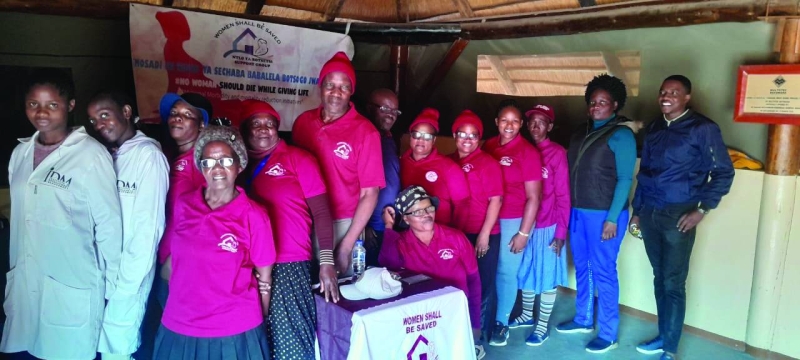Boteti NGO fights maternal mortality
Chakalisa Dube | Tuesday August 15, 2023 06:01


Previously, numerous challenges were observed in addressing maternal deaths and birth-related issues in various villages and settlements in the region. Concerns were also raised about the commitment to antenatal care in the area.
Maternal mortality has been particularly pronounced in remote areas like certain settlements and villages within Boteti, where access to medical services remains severely limited. In 2019, Botswana reported a maternal mortality rate of 166 deaths per 100,000 births, more than twice the average for upper-middle-income countries.
However, there seems to be a positive shift in the trend within Boteti, as stated by Joyce Mukani, the founder of ‘Ntlo Ya Botsetsi’ and the Maternal Mortality Reduction Coordinator for Boteti District Health Management Team.
Mukani shared these insights during an interview with The Monitor on Saturday. ‘Ntlo Ya Botsetsi’ is a group established in 2018, based in Letlhakane, with a mission to provide support to expectant mothers before and after pregnancy, especially those who are HIV-positive, teenagers, and disabled women. Mukani noted that in the past, many women in Boteti faced post-birth complications or even death due to factors like hypertension and infections arising from insufficient commitment to antenatal care. She highlighted that delayed antenatal care often led to untimely detection of potential risks, resulting in complications or fatalities. Mukani expressed satisfaction that preventable pregnancy-related complications and deaths have significantly decreased in Boteti due to the group’s advocacy efforts. Expectant women are now more proactive in seeking appropriate medical care throughout their pregnancies, a positive shift from the past, particularly in remote rural areas.
However, challenges persist. The group urgently requires resources such as a vehicle to reach expectant mothers, particularly those residing in remote areas with limited access to medical facilities. “We are happy that deaths or complications from preventable conditions during pregnancy no longer occur that much in Boteti partly of our activism. Expectant women are now keen to receive the right medical care throughout their pregnancies until birth which was not the case in the past, especially in very rural areas,” she said. Additionally, they seek operational space to accommodate women who may struggle to access antenatal care due to their remote locations. Key maternity referrals in Boteti are mainly managed at Letlhakane Primary Hospital and health facilities in major villages, which is particularly challenging for individuals living in remote areas.
Due to space limitations, the group currently holds its meetings at the primary hospital. Mukani noted that community support plays a crucial role in encouraging expectant mothers to access proper antenatal care. One noteworthy example is the village of Khwee, where community members have helped identify pregnant women and promote timely antenatal care. 'They have also been key in terms of helping us disseminate our message or articulating our mandate,” she said.
Since August of the previous year, the group has been running a campaign under the slogan 'No Woman Should Die While Giving Life'. This initiative aims to prompt women to register their pregnancies promptly and commit to antenatal care. She added: “So far 40 women in villages such as Mopipi, Mosu, and Letlhakane have registered their pregnancies timely through the campaign. We will be visiting more villages and settlements soon with a view of encouraging women to commit to antenatal care.” The group plans to extend their outreach to more villages and settlements soon. Timely registrants of the campaign receive essentials such as toiletries and children’s clothing. ‘Ntlo Ya Botsetsi’ relies on the support of well-wishers to carry out its initiatives.
